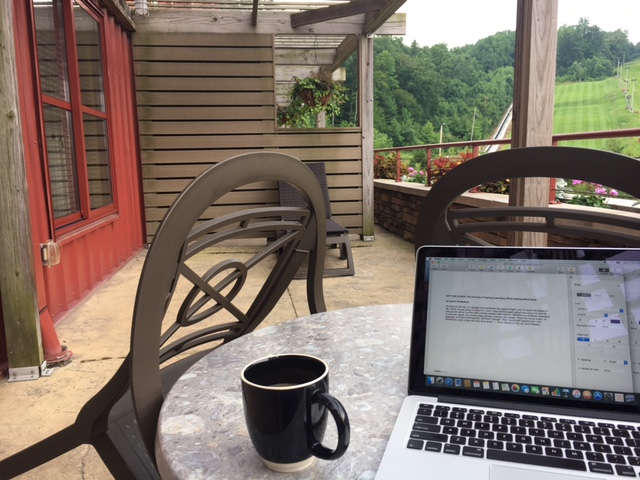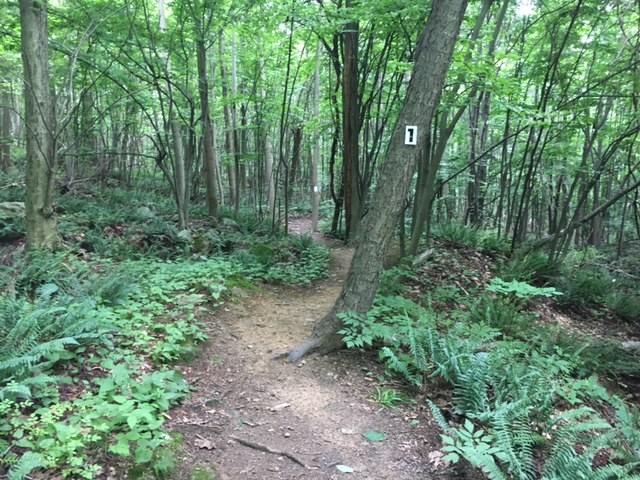 I have been doing a bit of “deep work” this week, getting my manuscript of Off the Clock in shape to turn into my editor. Since I’m speaking at a conference here in the PA mountains Wednesday, I elected to drive up a few days early to finish the book in solitude.
I have been doing a bit of “deep work” this week, getting my manuscript of Off the Clock in shape to turn into my editor. Since I’m speaking at a conference here in the PA mountains Wednesday, I elected to drive up a few days early to finish the book in solitude.
It’s been good. I love the concept of writing retreats. While writing is my job, the rest of life often conspires to chop up the time I can devote to it. Here, I am removed from all ability to drive children to places, or referee requests to use the home computer. A few observations:
Retreats don’t have to be long. I’ll be here about 48 hours, all together, and some of that includes the conference. I had a discussion on Twitter recently about whether women can do “deep work.” Many of us have caregiving responsibilities that preclude shutting the world out for long. But just because I’m not going to go sit in a cabin in the woods for 3 months doesn’t mean the alternative is nothing. These things are not either/or.
I am not a machine. I have nothing I need to do here but work. And yet it is still not possible to work around the clock. I have to manage my energy to do the tough edits that need to get done. The upside of a retreat, though, is I can take breaks when I need them, and not when the schedule forces it (e.g. I can  hear the kids are home for lunch, so I leave my office to meet them). So, for instance, when I found my attention flagging in late morning, I went for a hike. When I came back (a wee bit later than intended — whoops — should have paid more attention to the trail map) I was very ready to tackle the next chapter.
hear the kids are home for lunch, so I leave my office to meet them). So, for instance, when I found my attention flagging in late morning, I went for a hike. When I came back (a wee bit later than intended — whoops — should have paid more attention to the trail map) I was very ready to tackle the next chapter.
My best editing strategy: force it shorter. I spent a number of years early in my career writing for publications (USA Today, Reader’s Digest) that stressed economy in words. I learned that almost anything can be made tighter, and doing so often improves the reading experience. I learned recently that Off the Clock will be published in a smaller format (5×7) than usual, to look more like a “gift book” (a lot of wellness books fall in that category). So it really needs to be under 60k words to avoid looking like a door stop. It was over that. In the past week, I added an epilogue but also managed to cut enough words to get it under that. It’s a great forcing mechanism. Do I really need that sentence? That paragraph? Is that word adding anything to that thought? If not, it goes. The need to get my word count under 60k forced me to deal with parts that were problematic before. I highly recommend this as a writing strategy. Look at the word count of a first draft, then figure out a target 10-15% below that. By getting there, you’ll make the manuscript better.
Good self-care makes work easier. Hikes, morning runs, sleeping 9 hours last night — wow! It makes up for the 2 hours I was up with the 2-year-old (1:30-3:30 a.m.) the other day.
I am excited about this book. It will be out May 29, 2018. I hope you will be excited about it too.
Photos: Writing on my balcony; the start of what turned out to be a quite lengthy hike.

I would love a mini retreat. Such a great idea. And yes, I’m excited about Off The Clock!
My critique group retreats together for a handful of days every September. It’s one of the highlights of my year.
Glad to hear you had a good retreat. I always picture retreats as one very specific thing, Walden Pond-esque or nothing at all, but that is clearly not the only type of retreat. I’m going to borrow your idea and next time I have a conference arrive a few days ahead of time and do some of the ‘deep work’ that seems to get lost in the shuffle of everyday life.
@Monica- It really can do the trick. You’re already flying somewhere, so you probably only have to spring for an extra night or two of hotel costs. No cabin in the deep woods required.